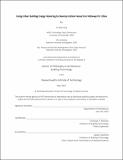| dc.description.abstract | Cities have been the nexus of economic activity and growth, but they have an insatiable appetite for energy. In response to the challenges and potential impact of climate change, cities and municipalities around the world are developing climate action plans to reduce carbon emissions and enhance resilience of their built environments. However, policymakers require a data-driven method to identify the most impactful, economical, and feasible strategies – and further translate these to actionable policy levers. This research serves to democratize and facilitate the wider use of urban building energy models in cities and municipalities.
First, key applications and use cases of urban building energy modeling (UBEM) are identified, and a minimum viable UBEM is introduced for each use case. This framework streamlines computational requirements, data, and calibration needs, promoting more rapid development and utilization of UBEMs. Second, a web-based framework to rapidly generate UBEMs for carbon reduction technology pathways is developed, subsequently piloted in the City of Evanston, and found to significantly reduce time and resources needed for developing and utilizing UBEMs. The approach was further validated in collaboration with policymakers and researchers in eight cities – viz. Braga (Portugal), Cairo (Egypt), Dublin (Ireland), Florianopolis (Brazil), Kiel (Germany), Middlebury, VT (USA), Montreal (Canada), and Singapore. Finally, conventional UBEMs typically only incorporate building properties and characteristics. This dissertation also presents an exploratory approach – using supervised and unsupervised data science / machine learning methods – to integrate building properties with socio-economic data from census for better inference and understanding of energy use in cities
Each approach is documented with the relevant results compared against conventional modelling workflows and / or validated through real-world urban case studies. The major contribution is the development and validation of methods and frameworks that can rapidly and automatically generate UBEMs to help cities and municipalities develop carbon reduction pathways to impact. | |
